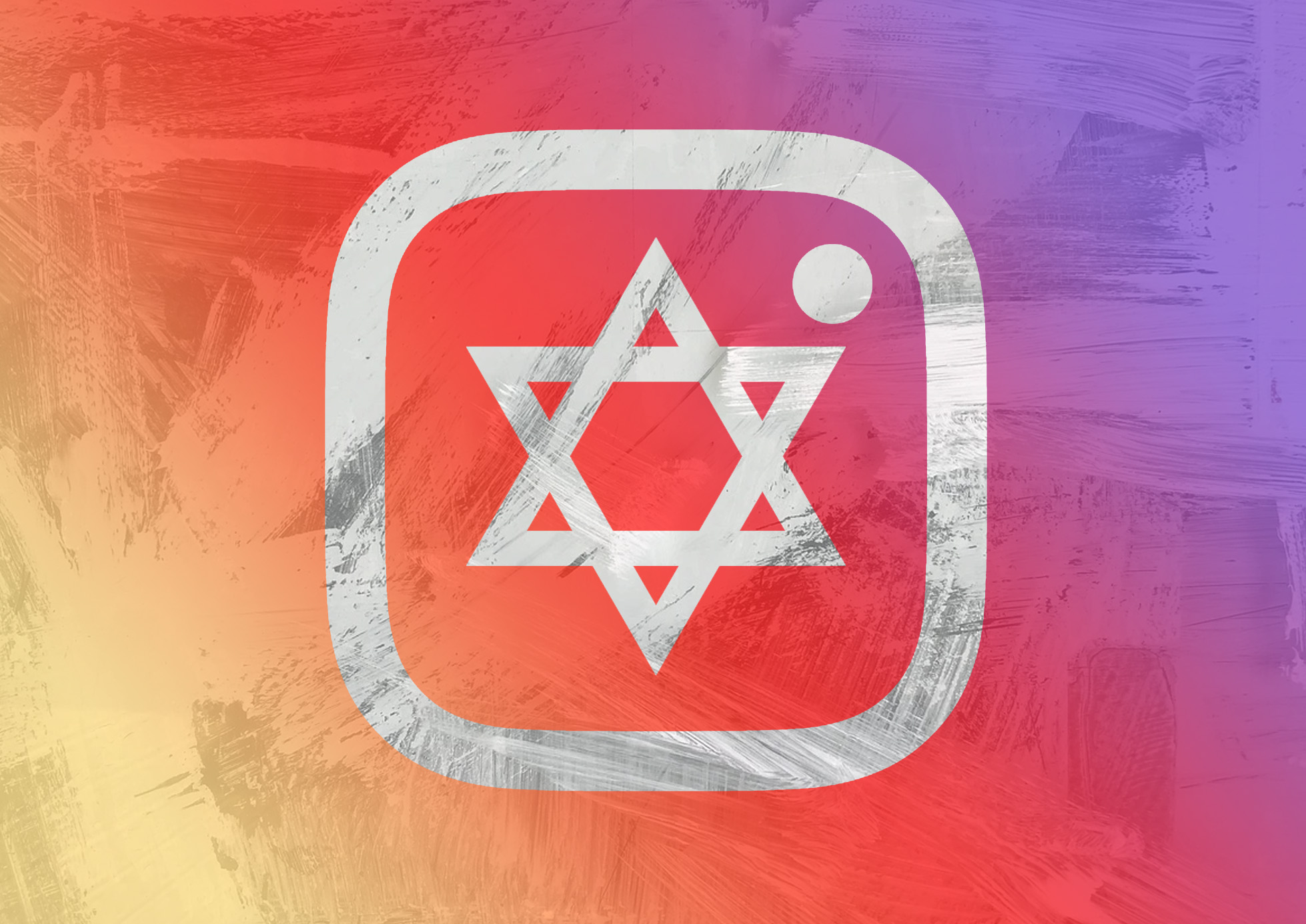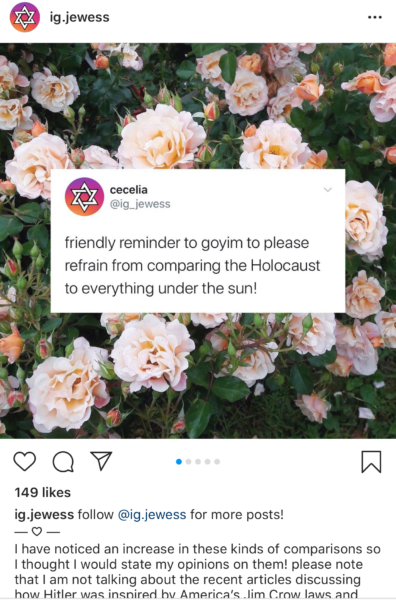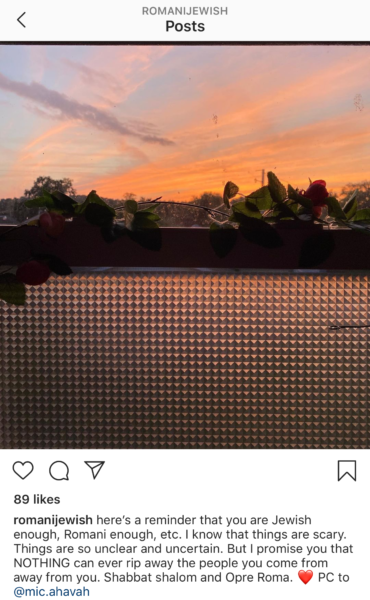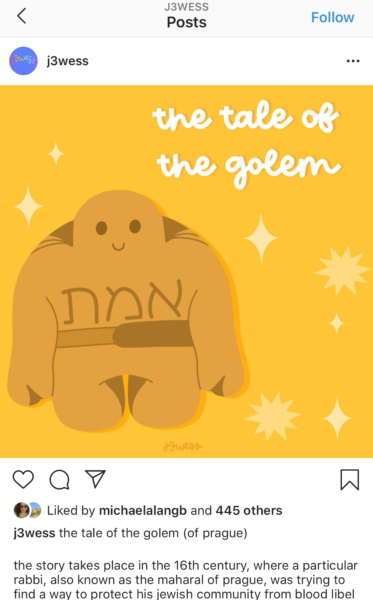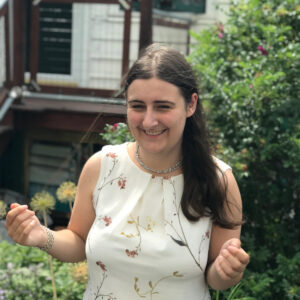I joined religious school in 6th grade as a shy, self-conscious middle-schooler. It was my first involvement with organized Judaism or formal Jewish education. My peers had known each other for years and I felt an immediate and lasting need to play catch up. I did so by learning everything I could and in search of that learning, I took to Instagram. There, I found a world of educational Jewish content, much of it created by young Jewish women just like me.
Social media is often decried for its hosting of hateful content and perpetuation of harmful standards and extreme pressure, especially for young people. These are real issues, but they are only one side of what apps like Instagram have to offer. Social media can be an incredible vessel for communication, education, and community across social and geographic divisions. This is especially critical within the Jewish community because our small population can make division even more devastating and isolate Jews outside of urban Jewish centers.
When used with serious intention, commitment, and integrity, people of all ages and backgrounds are turning Instagram accounts into tools for empowerment and education. I talked to four young Jews who, along with many others are taking this opportunity to create the Jewish content that they want to see and are shaping the future of Jewish education.
@ig.jewess
Jewish Instagram has been a place of community and connections for @ig.jewess, age 16. She started her account after moving from her Jewish elementary school to a secular middle school, a sudden change “from being immersed in Jewish culture and prayer to having almost none of it outside of the synagogue and holidays.” She felt disconnected from her Jewish identity until she decided to join the online Jewish community, where she found herself “suddenly…surrounded by hundreds of other passionate Jewish teens just like me.”
Online, she’s taken advantage of the Internet’s ability to foster connections. “I’ve had some lovely personal conversations with many account owners [and] formed friendships with several of my followers with personal accounts who are interested in learning more about Judaism,” @ig.jewess explained in an interview. She also contributes to creating a supportive Jewish activist and educational community by mutually supporting other accounts through likes, shout-outs, or sharing posts.
Her own content consists of text, often in the form of screenshots from her Twitter, along with accompanying graphics on topics of Jewish identity, antisemitism, and Israel. She also talks about social issues beyond Judaism such as Black Lives Matter and the August explosion in Beirut. All of her posts share a background image of roses which creates a cohesive theme to her account.
Her content is educational and shares her perspective but her process has also included a lot of listening and learning. “As I’ve grown in this space I’ve met so many amazing people and heard their stories, and while I initially created my account because I felt that I should share my Jewish voice, I’ve found that listening to others and amplifying their voices is just as fulfilling,” she reflected.
@romanijewish
The second account I talked to is @romanijewish, a 21 year old from Ohio. As her username suggests, she is both Jewish and Sinti, a Romani tribe from Central Europe, an identity she didn’t discover until she was 19. @romanijewish started her account after this revelation to connect with her identities and find a sense of community she had never had with other Roma and Jewish people. Now that she has found that community, including forming strong online friendships, she uses her account to provide resources to others by sharing relatable content for other Jewish and Romani people and educating anyone who genuinely wants to learn.
Though many of her posts are educational or funny, her content is closely tied to her sharing of her personal life. Her feed includes photos of herself, screenshots of paragraphs written on Instagram stories, and original memes. In her captions she shares content about Jewish and Romani identity, history, and discrimination as well as sharing her personal life including her experiences with autism, sex work, mental health, and sexual assault.
She has received incredible responses, especially from Romani Jews who didn’t realize that there were others with their shared ethnic background. These messages always bring her to tears. “Almost two years later, I never expected to have that sort of impact on strangers,” she said.
At the same time, she has faced the vicious hatred experienced by so many online creators, especially those from marginalized backgrounds, including people wishing for her death and accusing her of faking her identity. The hatred has been extremely hard on her mental health, she said, at times triggering massive breakdowns and causing her to take multiple breaks from social media.
Experiencing both hatred and support has led her to become more confident sharing her ethnic background and standing up against hateful or ignorant behavior, even if it means losing people in her life. “I would rather be unapologetically the person my ancestors survived to create than to become who our colonizers tried to shape our peoples into,” she said.
@j3wess
@j3wess, an 18 year old leftist Jew, uses her account to tie together her Jewish identity and values with her passion for artwork that she reconnected with during quarantine. All of her content features her cute illustrations and handwriting in bright colors, discussing topics like antisemitism, Jewish culture, and Israel. Some of her recent posts feature original illustrations, like a smiling golem which she is also selling on Redbubble as stickers. She has a goal of $500 in the next six month, with all of the money she raises going to nonprofits such as B’tselem, Black Lives Matter, and the Minnesota Bail Fund.
Her drive to raise money and help others is rooted in Jewish values, such as tikkun olam, which have always been a central part of her Jewish identity. They are what inspired her to turn her account, which she founded in 2018, from a space to express her fears about antisemitism and the future into a platform to educate and take action.
When @j3wesspublicly shares content, particularly about antisemitism, she faces hate from across the Internet, such as one post about Israel. “I expected only my followers to view it but it exploded and I had to eventually turn off comments on the post because I had people commenting horrid things and I had death threats in my dms. The same thing happened with my recent post about antisemitic memes. It sucks to be completely honest because I like to use my account to stimulate discussion and when I’m forced to turn off the comments I do the opposite of that,” she shared.
At the same time, her Jewish followers give her valuable and motivating positive feedback. “I get countless dms of people telling me that I’ve been able to put into words what they’ve been unable to. I get told that my account has helped people on their journey to reconnect with Judaism which honestly means so much to me,” she said.
@thatjewishgirl_
@thatjewishgirl_, 16 years old, describes her upbringing in New York City as “a bit of a bubble when it comes to antisemitism [because] most of the people I know are either Jewish or have known Jewish people their entire lives.” While she grew up learning about antisemitism, she was shocked to see so much of it online. “When I got Tik Tok and really started to see the prevalence of Jew hatred on social media it wreaked havoc on my mental health,” she reflected.
The experience inspired her to follow Jewish accounts and consider making her own. The final catalyst for creating her account was an awful conversation on Instagram with a person she had met in an online class. “[This person] was very left wing and very antisemitic and the combination of self righteousness and ignorance (and unwillingness to hear me out) was so absolutely frustrating that I needed an outlet to write about it.”
Beginning without a clear plan, establishing and running her account has been a learning process. Her posts are shaped by current events and her interests. She researches various aspects of antisemitism using sources ranging from My Jewish Learning to Forbes and presents them as paragraphs of text along with relevant images. All of her title slides use the same template, along with alternating pastel purple and blue backgrounds to create a cohesive theme. While she focuses on antisemitism, she also balances her desire of creating a community for Jews with wanting to produce educational content for non-Jews.
Throughout her work on her account she has received antisemitic hatred, questioning, and harassment alongside genuine questions and appreciation from Jewish followers. Her thinking has also evolved. “In terms of certain topics at first I became more defensive/impassioned, but now am better able to listen and learn,” she said. At the same time, she has grown less willing to debate antisemitism or antisemitic behavior and now tends to block people rather than engaging in bad faith or hateful conversations.
Jewish Social Media is Jewish Education
When I discovered these accounts for the first time, I was fascinated by the information they shared, but even more deeply moved by the knowledge of these passionate and interested young Jewish people with the commitment and courage to create this content. Its existence is a clear image of young Jews’ dedication to Jewish involvement. Their work is a crucial part of supporting and connecting young Jewish people and combating growing online antisemitism and ignorance about Jewishness.
The time and effort that are poured into these accounts, and the positive feedback that they receive from so many other young Jews, is a shining example of what happens when young Jews are given the autonomy to create and join the Jewish spaces that work for them.
Social media is a critical tool in the future of education and these creators are at the forefront of this as young Jewish educators. Young Jews are the indisputable future of Judaism, and in order to create a successful Jewish future their voices must be listened to with care and respect. The work that they are already contributing to the Jewish community deserves to be validated, uplifted, and honored within the world of Jewish publishing and content creation.
